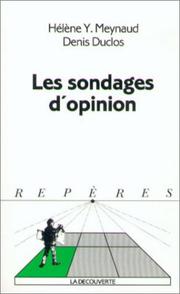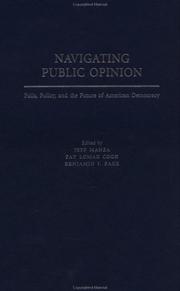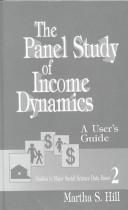| Listing 1 - 10 of 59 | << page >> |
Sort by
|
Book
ISBN: 1442227176 9781442227170 Year: 2014 Publisher: LANHAM ROWMAN & LITTLEFIELD
Abstract | Keywords | Export | Availability | Bookmark
 Loading...
Loading...Choose an application
- Reference Manager
- EndNote
- RefWorks (Direct export to RefWorks)
As the only complete compilation of polls taken by the Gallup Organization, The Gallup Poll is an invaluable tool for ascertaining the pulse of American public opinion throughout the year and for documenting changing perceptions over time of crucial core issues.
Public opinion --- Public opinion polls. --- Opinion polls --- Polls, Public opinion --- Public opinion research --- Straw votes --- Social surveys --- Market surveys --- Research
Book
ISBN: 0833095285 9780833095282 Year: 2016 Publisher: Santa Monica, Calif. RAND
Abstract | Keywords | Export | Availability | Bookmark
 Loading...
Loading...Choose an application
- Reference Manager
- EndNote
- RefWorks (Direct export to RefWorks)
Presidents --- Election forecasting --- Election --- Elections --- Forecasting, Election --- Straw votes --- Forecasting --- Public opinion polls --- Exit polling (Elections) --- Presidency --- Heads of state --- Executive power
Book
ISBN: 9780470291160 Year: 2008 Publisher: Hoboken Wiley
Abstract | Keywords | Export | Availability | Bookmark
 Loading...
Loading...Choose an application
- Reference Manager
- EndNote
- RefWorks (Direct export to RefWorks)
Election forecasting --- Exit polling (Elections) --- Voting research --- Elections --- Forecasting, Election --- Straw votes --- Forecasting --- Public opinion polls --- Voting --- Voting behavior research --- Polling, Exit (Elections) --- Data processing --- Research
Book
ISBN: 3518007122 Year: 1974 Volume: 712 Publisher: Frankfurt Suhrkamp
Abstract | Keywords | Export | Availability | Bookmark
 Loading...
Loading...Choose an application
- Reference Manager
- EndNote
- RefWorks (Direct export to RefWorks)
Interviewing. --- Public opinion polls. --- Sociology --- Methodology. --- Interviewing --- Public opinion polls --- Opinion polls --- Polls, Public opinion --- Public opinion --- Public opinion research --- Straw votes --- Methodology --- Research --- Questioning --- Counseling --- Focus groups --- Interviews --- Social case work --- Social surveys --- Market surveys

ISBN: 2707115673 9782707115676 Year: 1985 Volume: 38 Publisher: Paris : La Découverte,
Abstract | Keywords | Export | Availability | Bookmark
 Loading...
Loading...Choose an application
- Reference Manager
- EndNote
- RefWorks (Direct export to RefWorks)
Sondage d'opinion --- Public opinion polls --- 1586 --- Sondages d'opinion --- --Public opinion polls --- 311.213 --- 32.019.5 --- Opinion polls --- Polls, Public opinion --- Public opinion --- Public opinion research --- Straw votes --- Research --- Social surveys --- Market surveys

ISBN: 1282026054 9786612026058 1442681713 9781442681712 0802042740 0802081096 9780802042743 9780802081094 1442638710 Year: 1999 Publisher: Toronto
Abstract | Keywords | Export | Availability | Bookmark
 Loading...
Loading...Choose an application
- Reference Manager
- EndNote
- RefWorks (Direct export to RefWorks)
Politicians, government officials, and public relations officers lean heavily on polling when fashioning public policy. Proponents say this is for the best, arguing that surveys bring the views of citizens closer to civic officials. Critics decry polling's promotion of sycophantic politicians who pander to the whims of public sentiment, or, conversely, the use of surveys by special interest groups to thwart the majority will. Similar claims and criticisms were made during the early days of polling. When George Gallup began polling Americans in 1935, he heralded it as a bold step in popular democracy. The views of ordinary citizens could now be heard alongside those of organized interest groups. When brought to Canada in 1941, the Gallup Poll promised similar democratic rejuvenation. In actual practice, traditionally disadvantaged constituencies such as women, the poor, French Canadians, and African Americans were often heavily underrepresented in Gallup surveys. Preoccupied with election forecasting, Gallup pollsters undercounted social groups thought less likely or unable to vote, leading to a considerable gap between the polling results of the sampled polity and the opinions of the general public.Examining the origins and early years of public opinion polling in Canada, Robinson situates polling within the larger context of its forerunners - market research surveys and American opinion polling - and charts its growth until its first uses by political parties.
Public opinion polls --- Marketing research --- History. --- Canada --- Politics and government --- Market research --- Marketing --- Markets --- Opinion polls --- Polls, Public opinion --- Public opinion --- Public opinion research --- Straw votes --- Research --- Research, Industrial --- Social surveys --- Market surveys --- History --- E-books

ISBN: 1280833505 0195348842 9780195348842 9781280833502 9786610833504 6610833508 9780195149333 0195149335 0195149343 0195149335 9780195149340 0197733670 Year: 2002 Publisher: Oxford ; New York : Oxford University Press,
Abstract | Keywords | Export | Availability | Bookmark
 Loading...
Loading...Choose an application
- Reference Manager
- EndNote
- RefWorks (Direct export to RefWorks)
Do politicians listen to the public? When? How often? Or are the views of the public manipulated or used stragically by elites? In this book, leading scholars of American politics assess and debate the impact of public opinion on policymaking.
Public opinion polls. --- Public opinion --- Opinion polls --- Polls, Public opinion --- Public opinion research --- Straw votes --- Social surveys --- Market surveys --- Research --- Public opinion polls --- #SBIB:024.IO --- #SBIB:324H50 --- Politieke participatie en legitimiteit (referenda, directe democratie, publieke opinie...)

ISBN: 1322422532 1483345246 1452253374 9781452253374 9781483345246 0803943679 9780803943674 0803940378 9780803940376 9781322422534 Year: 1992 Publisher: Newbury Park, Calif. Sage Publications
Abstract | Keywords | Export | Availability | Bookmark
 Loading...
Loading...Choose an application
- Reference Manager
- EndNote
- RefWorks (Direct export to RefWorks)
The answers to questions on a wide variety of social and political issues from more than 25,000 respondents are contained in the General Social Survey (GSS) data base. The authors, who have directed the GSS since its inception, have set out to enable social scientists to exploit this large data set more effectively. The book outlines such topics as the recurrent, replicated `core' items suitable for trend analyses, the annual topical modules on subjects of current interest and the international modules produced in collaboration with the International Social Survey Programme.
Public opinion polls. --- Social surveys --- Opinion polls --- Polls, Public opinion --- Public opinion --- Public opinion research --- Straw votes --- Market surveys --- Research --- NORC (Organization) --- University of Chicago. --- N.O.R.C. (Organization) --- NORC at the University of Chicago --- National Opinion Research Center
Book
ISBN: 9780773422070 0773422072 9780773438279 0773438270 Year: 2009 Publisher: Lewiston Edwin Mellen Press
Abstract | Keywords | Export | Availability | Bookmark
 Loading...
Loading...Choose an application
- Reference Manager
- EndNote
- RefWorks (Direct export to RefWorks)
This interdisciplinary monograph analyzes presidential and legislative elections themes. Topics covered in the work include a critical discussion of all the forecasting models used in the past 20 years, and an examination of the forecasting of Presidential elections from an engineering and mathematical point of view, and actual mathematical equations between predicted votes and the polls.
Election forecasting -- United States -- Methodology. --- Election forecasting -- United States. --- Political science -- United States. --- Election forecasting --- Government - U.S. --- Law, Politics & Government --- Political Rights - U.S. --- Elections --- Forecasting, Election --- Straw votes --- Forecasting --- Public opinion polls --- Exit polling (Elections) --- Methodology
Book
ISBN: 1108877427 1108890490 1108892132 1108792464 Year: 2021 Publisher: Cambridge : Cambridge University Press,
Abstract | Keywords | Export | Availability | Bookmark
 Loading...
Loading...Choose an application
- Reference Manager
- EndNote
- RefWorks (Direct export to RefWorks)
Public opinion polls have become increasingly prominent during elections, but how they affect voting behaviour remains uncertain. In this work, we estimate the effects of poll exposure using an experimental design in which we randomly assign the availability of polls to participants in simulated election campaigns. We draw upon results from ten independent experiments conducted across six countries on four continents (Argentina, Australia, Canada, New Zealand, the United Kingdom, and the United States) to examine how polls affect the amount of information individuals seek and the votes that they cast. We further assess how poll effects differ according to individual-level factors, such as partisanship and political sophistication, and the content included in polls and how it is presented. Our work provides a comprehensive assessment of the power of polls and the implications for poll reporting in contemporary elections.
Public opinion polls --- Election monitoring. --- Election forecasting. --- Political aspects --- Elections --- Forecasting, Election --- Straw votes --- Forecasting --- Exit polling (Elections) --- Election observation --- Monitoring, Election --- Poll watching --- Opinion polls --- Polls, Public opinion --- Public opinion --- Public opinion research --- Social surveys --- Market surveys --- Research
| Listing 1 - 10 of 59 | << page >> |
Sort by
|

 Search
Search Feedback
Feedback About UniCat
About UniCat  Help
Help News
News